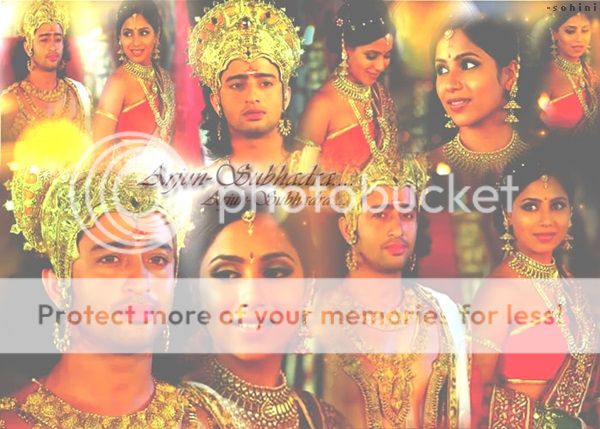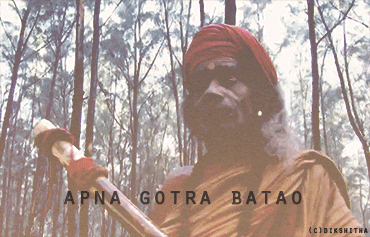Arjun is the third of the Pandavs,the sons and princes of Pandu, who with Krishna,is considered to be the hero of the Hindu Epic cycle Mahabharat. In his role in the Mahabharata, Arjun is a key part of the Bhagavad Gita which is perhaps the best known sacred Hindu text in the West.
NAMES OF ARJUNA: FROM GEETA..
Arjuna - Silver white; the third son of PAndu and intimate friend of Lord Krishna.
Anagha - Sinless one
Bharata - Descendant of Bharata
Bharatarsabha - Chief amongst the descendants of Bharata; best of the Bhratas.
Bharatasattama - Best of the Bhratas
BharataSreshta - Chief of the BhAratas
Dehabhrtam vara - Best of the embodied
Dhananjaya - Conqueror of wealth
Dhanurdhara - Carrier of the bow and arrow; carrier of the GAIva bow, which can never be defeated in war.
Gudakesa-Arjuna, - The master of curbing ignorance.
Kapidhvaja - He whose flag was marked with HanumAn
Kaunteya - Son of KuntI
KiritI - Diademed one.
Kurunandana - Beloved child of the Kurus
KurupravIra - Best among the Kuru warriors
Kurusattama - Best amongst the Kurus
KuruSreha - Best of the Kurus.
Pandava - The son of Pandu.
Parantapa - Chastiser, subduer, conqueror of the enemy
Partha - Son of Pritha (KuntI)
Purusarsabha - Best among men.
PurusavyAghra - Tiger among men.
Savyasachi - Ambidextrous archer.
Tata - My (Krishna's) friend
Arjun was the student of Drona. He was considered the finest archer and a peerless warrior by many notable figures in the Mahabharata, such as Bhishma, Dronacharya, Krishna, Vidur and Dhritarashtra. According to his rival Karna, only Shiva would not fear the sight of Arjun bearing down on him. He played a key role in ensuring the defeat of the Kauravs in the Kurukshetra War. He was considered to be an undefeated hero, claimed to have never tasted defeat until losing the dice game to his cousins. Arjun was an avatar of Nara, who along with the avatar of Narayan, Krishna, established Dharma in the Dvapara Yuga.
Arjuna married Draupadi, Subhadra, Uloopi, and Chitrangada. His children included Strutakirti, Abhimanyu, Babruvahana, and Iravan.
Tutelage under Drona

Under Drona's tutelage, the Kauravas and the Pandavas, along with the princes of Hastinapur's allies and vassals, learned weaponry. Arjun became Drona's favorite and most accomplished pupil; specifically, he became a master in using the bow and the arrow. In a famous incident, Drona deemed that out of all his students, even his own son Ashwatthama, none but Arjun had the steadfast focus to shoot a bird on a tree; he was proven right. Arjun was the only one with the skill and fortitude to save his teacher from an attack from a crocodile. In reality, the attack was a ruse Drona used to test his students. In another story, Arjun, noticing Bhima eating in the dark, trained himself to shoot accurately without visualizing his target. Impressed by Arjun, Drona promised his pupil that he would make Arjun the greatest archer that ever lived or ever would live. Drona adhered to this vow so strongly, that when he discovered a Kirant prince Ekalavya of superior archery skill, Drona tricked him into cutting off the thumb of his hand(needed to string the bow). As part of his gurudakshina, Arjuna and his brothers, with no other soldiers, attacked Panchal and captured King Drupada, with Arjun making the arrest himself. Drona requested this in order to settle an old grudge he had with Drupada. Secretly, Drupada was greatly impressed by Arjun and wished for him to marry his daughter, Draupadi.
Arjun on gurukul with Guru Dronacharya
Of all the Kaurava and Pava brothers training under Droa, Arjun emerged as the most dedicated, hard-working and most naturally talented of them all, exceeding even Droa's own son Asvatthama. Arjuna assiduously served his teacher, who was greatly impressed by this devoted pupil. Arjuna surpassed Droa's expectations in numerous challenges. When Droacharya tested the princes' alertness and ability by creating an illusion of a crocodile attacking him and dragging him away, most of the princes were left dumbfounded. Arjuna, however, swiftly fired arrows to slay the illusionary animal, and Drocrya congratulated Arjuna for passing this test. As a reward, Droa gave Arjuna mantras to invoke the super-powerful divine weapon of Brahma known as Brahmastra, but told Arjuna not to use this invincible weapon against any ordinary warrior. The weapon had a sharp edge surrounded below by three heads of Lord Brahma. Droa gave each prince a pot to fill with water before he imparted lessons. He gave his son Asvatthama a wide-necked pot unlike the others' narrow-necked ones, and gave him special knowledge, when others took time to return. But Arjuna used his knowledge of a mystical water weapon, Varunastra to fill his pot swiftly and started returning as early as Aswatama. In a great challenge, Droa set up a wooden bird upon a tree, and from across the adjacent river, asked the princes to shoot it down by striking its eye. When prince Yudihira tried first, Droa asked him what he saw. Yudihira replied that he saw Droa, his brothers, the river, the forest, the tree and the bird. Droa replied that Yudihira would fail and asks another prince to step forward. The others gave the same reply, and Droacharya was disappointed with all. But when Arjuna stepped forth, he told Droacharya that he saw only the eye of the bird and nothing else. Droa asked him to shoot, and Arjuna did strike the bird down in the eye. Drona asked the cook never to serve food to Arjuna in the dark and also tells the cook that he should not tell Arjuna about this order from Drona. One day Arjuna was eating food and the light was put off by the wind. Arjuna noted that even in complete darkness, by practice, hands would reach one's mouth. This struck Arjuna, and he started to practice archery in darkness. He began training by night to use his weapons in absolute darkness, and steadily achieved a great level of skill. Droa was greatly impressed by Arjuna's concentration, determination and drive, and promised him that he would become the greatest archer on earth. Droa gave Arjuna special knowledge of the Devastras that no other prince possessed.
About Arjun's razor sharp focus
Drona Archarya was the greatest teacher in Archery who ever lived. Following him as a group of students were Arjuna, Ashwathama, Yudhistar and many others. Among these Arjuna excelled in archery. One day other students openly criticized Drona for favouritism towards Arjuna, telling him they too were not less skillful in archery. "Tomorrow, there will be an archery competition to find out the best archer," Drona replied. The next day Drona hung a wooden bird on a tree far from them. "See that wooden bird perched on the tree ahead of us? Aim at its eye," he said. He calls the first student - Yudhistar. Yudhistar plucked an arrow from the quiver, placed it on the bow, and pulled the string. "What do you see?" Drona asked. "I see the sun, the clouds, the trees," Yudhistar replied as he released the string. The arrow shot forward and landed yards away from the tree. Another student - Ashwathama took his position. He plucked an arrow from his quiver, placed it on the bow, and pulled the string. "What do you see?" Drona asked. "I see the bird, its legs, the twigs on the branch in which the bird sits, the small mango behind the bird, the leaves surrounding the bird, a small worm on the branch that approaches the bird." The surrounding crowd is amazed. Other students could barely see the bird and nobody else had the eyesight to spot so many small details that Ashwathama so casually spotted. As he released the string, the arrow shot forward and landed near the roots of the tree. Similarly the rest tried but none succeed. Finally it was Arjuna's turn. He plucked an arrow from his quiver, placed it on the bow, and pulled the string.As Arjuna released the string, the arrow shot forward with a swoosh. It pierced the center of the eye of the wooden bird.
Arjun's Friendship with Krishna (Mahabharat)
Krishna and Arjun also shared many common interests. Both liked to travel far and wide and wanted to know different cultures and geographies of ancient India. Both liked music, dance and acting. Both of them treated men and women equally. Both of them earned the attention of women very easily. Both liked philosophical concepts. Both were educated in Vedas and wanted to improve the well being of the Vedic society through their own contributions. Both of them were strategists, planners and city-builders. These two men were revolutionary in their attitude. They studied the structure of the Vedic society and identified its weaknesses and strengths. They reviewed all the prevailing beliefs with a critical eye. Their interests pondered around varied subjects, from city-building and long distant travel to high philosophy. Krishna firmly believed in action and was critical of the popular ascetic notion that one can attain salvation by doing nothing. Krishna asserted that salvation is achieved not by renouncing action but doing action while staying unattached to the results of action. Both believed that the four orders of society were to be reckoned based on ones actions rather than on ones birth, a view shared by king Yudhisthira too. However this was against the prevailing orthodox view. Krishna also questioned the blind following of Vedic rituals. Krishna and Arjuna thus brought forth a new way of life and a new philosophy and perspective for ancient India. Krishna took the lead and Arjuna was his natural assistant. Krishna's philosophical conversation with his friend and cousin Arjuna during the Kurukshetra War later became known as the famous Bhagavad Gita, the holy book of Hindus. How he amassed this great knowledge is revealed in the Anugita chapters of Mahabharata, which states that he got this knowledge by interactions with many learned men, and by his own meditations.
Bonding between Krishna and Arjun
As Nara of Nara Narayana (an avatar of Vishnu), Arjun embodies Kshatriya manhood. Krishna being Narayana of the Nara Narayana avatar, symbolizes the atman, and hence the two are inseparable. Arjun was chosen by Krishna to be his dearest friend and disciple. In the great epic, on several occasions, Krishna reveals his great and eternal love for Arjun. Krishna states that no one in the world is dearer to him than Arjun and that there is nothing in the world that he wouldn't give his friend.Krishna refers to Arjun as "Purusharshva", which translates to best of men.
About Arjun and bonding between krishna and Arjun
Arjun was a specialist with the bow and arrow, and tales of his archery skills have become legendary.Arjun's bow is named Gandiva.The bow was created by Brahma, the Creator of universe, the supreme God in Hindu theology.The Mahabharata refers to Arjun by twelve different names. These names are told by Arjun to Prince Uttar as proof that he is real Arjun at the last day of his "Agyat Waas" while he was about to fight the Kuru Army.
Mahabharata - Kurukshetra War
The Mahabharata centers on the exploits of the Pandavas and the Kauravas, two families of royal cousins descended from two brothers, Pandu and Dhritarashtra, respectively. Because Dhritarashtra was born blind, Pandu inherited the ancestral kingdom, comprising a part of northern India around modern Delhi. The Pandava brothers were Yudhishthira the eldest, Bhima, Arjuna, Nakula, and Sahadeva. The Kaurava brothers were one hundred in number, Duryodhana being the eldest. When Pandu died at an early age, his young children were placed under the care of their uncle Dhritarashtra who usurped the throne. The Pandavas were endowed with righteousness, self-control, nobility, and many other knightly traits. On the other hand, the hundred sons of Dhritarashtra, especially Duryodhana, were endowed with negative qualities and were cruel, unrighteous, unscrupulous, greedy, and lustful. Duryodhana, jealous of his five cousins, contrived various means to destroy them. Attempts by elders and Krishna who was a friend of the Pandavas and also a well wisher of the Kauravas, to resolve the issue failed. Nothing would satisfy Duryodhana's inordinate greed. War became inevitable. The Bhagavad Gita begins before the start of the climactic battle at Kurukshetra, with the Pandava prince Arjuna becoming filled with doubt on the battlefield. Realizing that his enemies are his own relatives, beloved friends, and revered teachers, he turns to his charioteer and guide, Krishna, for advice. In summary the main philosophical subject matter of the Bhagavad Gita is the explanation of five basic concepts or "truths". Krishna counsels Arjuna on the greater idea of dharma, or universal harmony and duty. He begins with the tenet that the soul (Atman) is eternal and immortal. Ishvara (The Supreme Controller) Jiva (Living beings/the individualized soul) Prakrti (Nature/Matter) Dharma (Duty in accordance with Divine law) Kaala (Time) The battle is "an allegory in which the battlefield is the soul and Arjuna, man's higher impulses struggling against evil and Lord Krishna is the Supreme Godhead Narayana. When we sum up its esoteric significance, it means the war which is constantly going on within man between the tendencies of good and evil. Gita is spoken by Lord Krishna, the Supreme avatar of Narayana in plain terms and professes to solve the great ethical and spiritual difficulties which the life of man raises. There are 6 arishadvargas or evils that the Gita says one should avoid, which are kama (lust), krodha (anger), lobh (greed), moha (delusion), mada or ahankar (pride) and matsarya (jealousy), which are the negative characteristics which prevent man from attaining moksha (liberation from the birth and death cycle). The Gita addresses the discord between the senses and the intuition of cosmic order. It speaks of the Yoga of equanimity, a detached outlook. The term Yoga covers a wide range of meanings, but in the context of the Bhagavad Gita, describes a unified outlook, serenity of mind, skill in action and the ability to stay attuned to the glory of the Self (Atman) and the Supreme Being (Bhagavan). According to Krishna, the root of all suffering and discord is the agitation of the mind caused by selfish desire. The only way to douse the flame of desire is by simultaneously stilling the mind through self-discipline and engaging oneself in a higher form of activity. However, abstinence from action is regarded as being just as detrimental as extreme indulgence. According to the Bhagavad Gita, the goal of life is to free the mind and intellect from their complexities and to focus them on the glory of the Self by dedicating one's actions to the divine. This goal can be achieved through the Yogas of meditation, action, devotion and knowledge.



















































































































































































comment:
p_commentcount